Module 6 Unit1 She was sitting by the river
外研版六年级上册英语 Module 6 知识清单
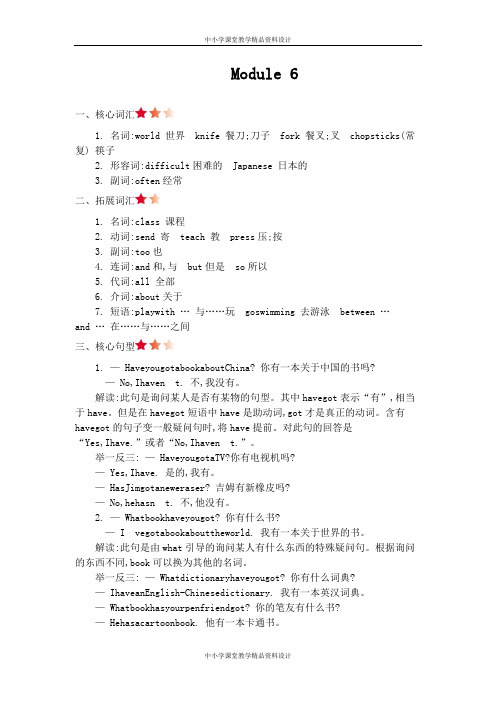
Module 6一、核心词汇1. 名词:world 世界knife 餐刀;刀子fork 餐叉;叉chopsticks(常复) 筷子2. 形容词:difficult困难的Japanese 日本的3. 副词:often经常二、拓展词汇1. 名词:class 课程2. 动词:send 寄teach 教press压;按3. 副词:too也4. 连词:and和,与but但是so所以5. 代词:all 全部6. 介词:about关于7. 短语:playwith …与……玩goswimming 去游泳between …and …在……与……之间三、核心句型1. — HaveyougotabookaboutChina? 你有一本关于中国的书吗?— No,Ihaven t. 不,我没有。
解读:此句是询问某人是否有某物的句型。
其中havegot表示“有”,相当于have。
但是在havegot短语中have是助动词,got才是真正的动词。
含有havegot的句子变一般疑问句时,将have提前。
对此句的回答是“Yes,Ihave.”或者“No,Ihaven t.”。
举一反三: — HaveyougotaTV?你有电视机吗?— Yes,Ihave. 是的,我有。
— HasJimgotaneweraser? 吉姆有新橡皮吗?— No,hehasn t. 不,他没有。
2. — Whatbookhaveyougot? 你有什么书?— I vegotabookabouttheworld. 我有一本关于世界的书。
解读:此句是由what引导的询问某人有什么东西的特殊疑问句。
根据询问的东西不同,book可以换为其他的名词。
举一反三: — Whatdictionaryhaveyougot? 你有什么词典?— IhaveanEnglish-Chinesedictionary. 我有一本英汉词典。
— Whatbookhasyourpenfriendgot? 你的笔友有什么书?— Hehasacartoonbook. 他有一本卡通书。
外研版八年级英语下册Module 6 Hobbies单元要点精析
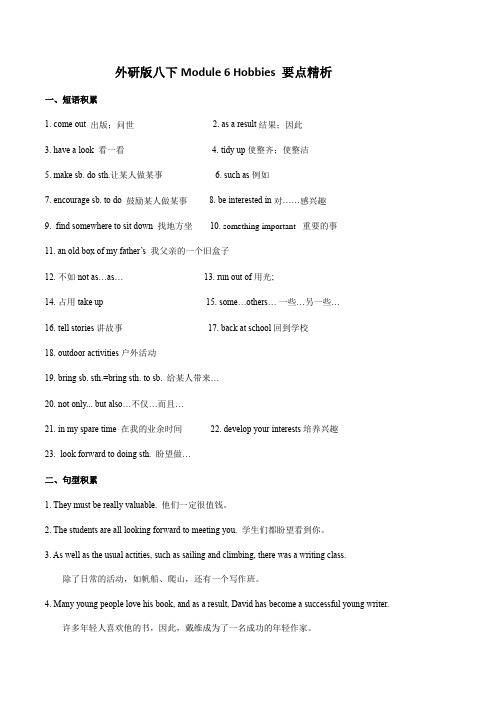
外研版八下Module 6 Hobbies 要点精析一、短语积累1. come out 出版;问世2. as a result结果;因此3. have a look 看一看4. tidy up使整齐;使整洁5. make sb. do sth.让某人做某事6. such as例如7. encourage sb. to do 鼓励某人做某事8. be interested in对……感兴趣9.find somewhere to sit down 找地方坐10. something important 重要的事11.an old box of my father’s 我父亲的一个旧盒子12.不如not as…as…13.run out of用光;14.占用take up15.some…others…一些…另一些…16.tell stories讲故事17.back at school回到学校18.outdoor activities户外活动19.bring sb.sth.=bring sth.to sb. 给某人带来…20.not only...but also…不仅…而且…21.in my spare time 在我的业余时间22.develop your interests培养兴趣23.look forward to doing sth. 盼望做…二、句型积累1. They must be really valuable. 他们一定很值钱。
2. The students are all looking forward to meeting you. 学生们都盼望看到你。
3. As well as the usual actities, such as sailing and climbing, there was a writing class.除了日常的活动,如帆船、爬山,还有一个写作班。
4. Many young people love his book, and as a result, David has become a successful young writer.许多年轻人喜欢他的书,因此,戴维成为了一名成功的年轻作家。
外研版七年级英语下册Module 6 教案
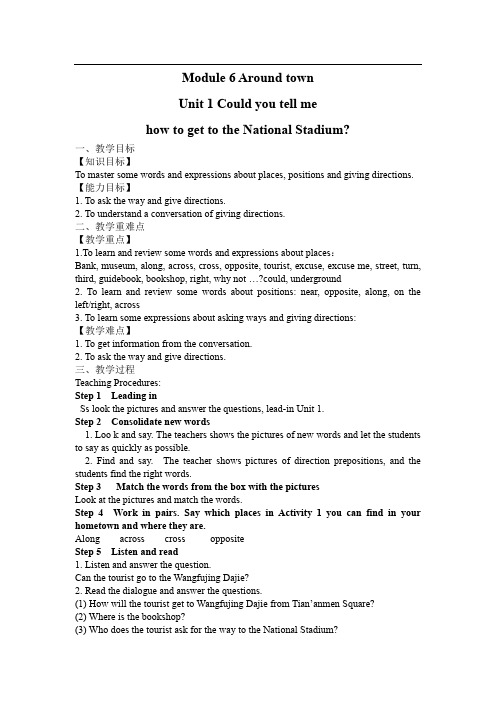
Module 6 Around townUnit 1 Could you tell mehow to get to the National Stadium?一、教学目标【知识目标】To master some words and expressions about places, positions and giving directions. 【能力目标】1. To ask the way and give directions.2. To understand a conversation of giving directions.二、教学重难点【教学重点】1.To learn and review some words and expressions about places:Bank, museum, along, across, cross, opposite, tourist, excuse, excuse me, street, turn, third, guidebook, bookshop, right, why not …?could, underground2. To learn and review some words about positions: near, opposite, along, on the left/right, across3. To learn some expressions about asking ways and giving directions:【教学难点】1. To get information from the conversation.2. To ask the way and give directions.三、教学过程Teaching Procedures:Step 1 Leading inSs look the pictures and answer the questions, lead-in Unit 1.Step 2 Consolidate new words1. Loo k and say. The teachers shows the pictures of new words and let the students to say as quickly as possible.2. Find and say. The teacher shows pictures of direction prepositions, and the students find the right words.Step 3 Match the words from the box with the picturesLook at the pictures and match the words.Step 4 Work in pairs. Say which places in Activity 1 you can find in your hometown and where they are.Along across cross oppositeStep 5 Listen and read1. Listen and answer the question.Can the tourist go to the Wangfujing Dajie?2. Read the dialogue and answer the questions.(1) How will the tourist get to Wangfujing Dajie from Tian’anmen Square?(2) Where is the bookshop?(3) Who does the tourist ask for the way to the National Stadium?Answers:(1) Go across Dong Chang’an Jie, go along the street and turn left the third street on the left.(2) The bookshop is just along Xi Chang’an Jie, on the right, opposite the bank.(3) A policeman.3. Point out the main points in the dialogue.Step 6 Complete the questions with the correct form of the words from the box. Then ask and answer the questions in pairs.1. ___________ me, is Wangfujing Dajie from Tian’anmen Square?2. There’re a bookshop near here. What’s the name of the ___________?3. Can a _________ ask a _________ the way to get to places in Beijing?4.____________ you tell me how to get to the National Stadium?5. Where’s the ___________ station?Answers:1. Excuse2. street3. tourist policeman4. Could5. undergroundStep 7 Listen and repeat1. Can you tell me the way to Wangfu jing Dajie?2. Go across Dong Chang’an Jie, go along the street and turn left.3. Is there a bookshop near here?4. Could you tell me how to get to the National Museum?5. Go along the street and you’ll see an underground station.Step 8 Read the conversation in Activity 3 again and complete the table.Ask AnswerCan you tell me the way to …?Go across …Make the conversation as much as possible in pairs.Step 9 Work in pairs. Draw a map of where you live. Show places.Now ask for and give directions to places on map.-Where’s the market?-It’s on …-How do I get there?-Go along …Step 10 Grammar问路的句型和指路的句型Step 11 Summary方位介词的用法。
四年级上册英语第六模块课文

外研版英语四上Module6 课文Unit1 It didn’t become gold1.Listen , point and say .I had noodles for breakfast yesterday .You had fish for breakfast yesterday .No, I didn’t have fish for breakfast . I had fish for dinner .2.Listen , point and find “didn’t”.Long long ago , there was a good boy . His name was Ma Liang. He helped people.He had a magic paintbrush .This old woman didn’t have food . So Ma Liang painted food . Then the food became real .There was a bad man . He took Ma Liang’s magic paintbrush .The bad man didn’t have gold .So he painted gold with the magic painbrush .But it didn’t become gold . It became a snake !Unit 2 He didn’t come back1.Listen and chant .Amy went to the park yesterday.She didn’t take the flowers away .She didn’t take the leaves away .She only took her painting away .2.Listen and say.The bad man was angry . The magic paintbrush didn’t help him. It only helped Ma Liang. He took Ma Liang away.“ I want a big ship,” said the bad man . “ You paint it !”So Ma Liang painted a ship . Then the ship became real . The bad man went to sea in the ship . But he didn’t come back.。
外研版高中英语必修四module6知识点(精品)
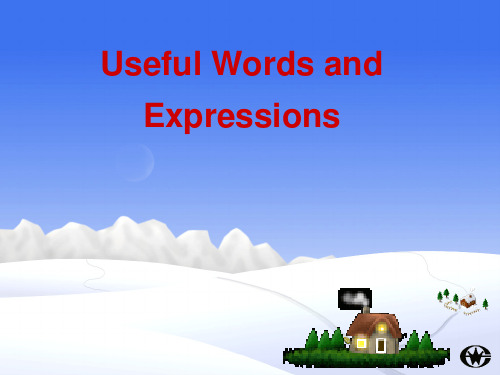
6. If you repeat something you ______. A. do it again B. stop doing it C. do it many times. 7. Something which appears can be_____. A. seen B. heard C. touched 8. Calm water is not_____. A. dangerous B. deep C. moving
Match the words with the definitions.
attack, claw, creature, dinosaur, footprint, hairy, monster, spirit, tail 1.an animal,especially if you don’t know what kind of animal it is. creature 2.an unknown animal that is big and frightening. monster
calm 6.She remained________at the frightening news.
Nouns
footprint
horn
creature
claw nail journal sighting seal surface
destruction
emperor robe reputation border identity myth fortune
尼斯湖水怪
冰 镐 和 脚 印
喜 玛 拉 雅 山 雪 人
古 怪 的 吸 血 动 物
喀 纳 斯 湖 水 怪
欧 肯 纳 根 水 怪
出现在美国佛蒙特州强普林湖的水怪
(三起点)外研版六年级英语上册《Module6__模块整体教案》

Module6 模块整体教案模块教学分析本模块主要学习句型:Darning has got a Chinese kite and we often fly it in the park. I’ve got a kite but I can’t fly it I’ve got a knife and fork, and chopsticks. I’ve got a stamp from China, but I haven’t got a stamp from Canada. 通过介绍不同国家的人们使用不同的物品进行文化对比,复习“have/has got”的用法。
第一单元教学内容围绕着主人公Darning的新朋友Laura写给Sam和Amy的一封请求成为他们的笔友的信展开了一系列对话和练习活动。
第二单元教学内容围绕中国小朋友玲玲和外国小朋友萨姆谈论个人所拥有的物品而展开。
本模块的教学重心应放在如何让学生用本模块主要句型“I have got... He/She has got… Have you got...?”谈论个人所拥有的物品,通过介绍不同国家的人们使用不同的物品进行文化对比,复习“have/has got”的用法。
本模块的功能是:初步掌握用本模块主要句型来谈论个人所拥有的物品。
第一单元主要是创设情景,引出话题从而进入重点语言知识的学习。
主要句型是Have you got..? Yes, I have. / No, I haven’t Darning has got a Chinese kite and we often fly it in the park 第二单元的主要句型是:I’ve got a knife and fork, and chopsticks. I’ve got a stamp from China, but I haven’t got a stamp from Canada.模块教学目标☆知识目标1. 能理解并会说唱Unit 2 Activity 5 Listen and say. Then chant.2. 能听、说、读、写Unit 1 Activity 1 Look, listen and say. Activity 3 Listen and say. Unit 2 Activity 1 Look, listen and say. Activity 2 Listen and read.中的单词和句子。
五年级上册英语第六模块
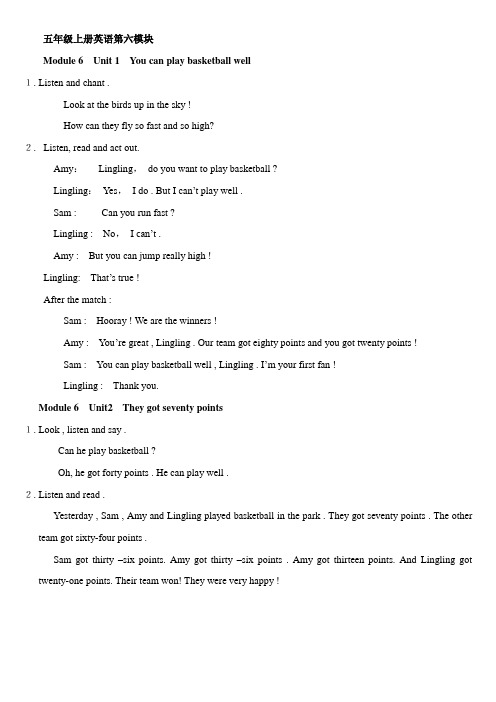
五年级上册英语第六模块Module 6 Unit 1 You can play basketball well1.Listen and chant .Look at the birds up in the sky !How can they fly so fast and so high?2.Listen, read and act out.Amy:Lingling,do you want to play basketball ?Lingling:Yes,I do . But I can’t play well .Sam :Can you run fast ?Lingling :No,I can’t .Amy : But you can jump really high !Lingling: That’s true !After the match :Sam : Hooray ! We are the winners !Amy : You’re great , Lingling . Our team got eighty points and you got twenty points !Sam : You can play basketball well , Lingling . I’m your first fan !Lingling :Thank you.Module 6 Unit2 They got seventy points1.Look , listen and say .Can he play basketball ?Oh, he got forty points . He can play well .2.Listen and read .Yesterday , Sam , Amy and Lingling played basketball in the park . They got seventy points . The other team got sixty-four points .Sam got thirty –six points. Amy got thirty –six points . Amy got thirteen points. And Lingling got twenty-one points. Their team won! They were very happy !。
外研版三起小学英语六年级上册第六模块备课

T: (Show a book) Look! I’ve got a book about animals. Have you got a book about animals?
S1: Yes, I have.
S2: No, I haven’t. I’ve got a book about…
教学辅助
点读笔 多媒体课件 学习任务单
教学方法
小组合作教学法 任务型教学法
教材及年级
名称
外研版三起点
六年级上册
模块名 称
M6 U1
You’ve got a letter from New York.
课时教材
分析
本课教材为外研社《英语》(新标准)(三年级起点)六年级上册Module 6 Unit 1 You’ve got a letter from New York.本单元的话题是谈论自己和他人拥有的物品。本单元的课文情境是Sam和Amy收到了Laura的来信,她希望与他们成为笔友。Laura在信中说,她是Daming的朋友,经常和Daming一起放风筝,放风筝对她来说很困难。Laura问Sam和Amy是否有介绍美国的书,如果没有,她可以给他们寄一本。最后她提到,Daming会很快给Sam和Amy写信。课文充分展示了Laura想结交新朋友的强烈愿望。学生通过学习进而能够运用所学语言谈论自己和他人拥有的物品。本单元的学习为全体学生在Unit 2运用英语详细介绍自己和好朋友的异同做了充分的准备。本单元共1课时完成。
课时教学
目标
通过本单元的学习,学生能够
1.在图片,实物帮助下初步了解书信或电子邮件的书写形式
2.通过阅读练习活动知道Laura的基本情况和所拥有的物品。
英语必修三6 Module6
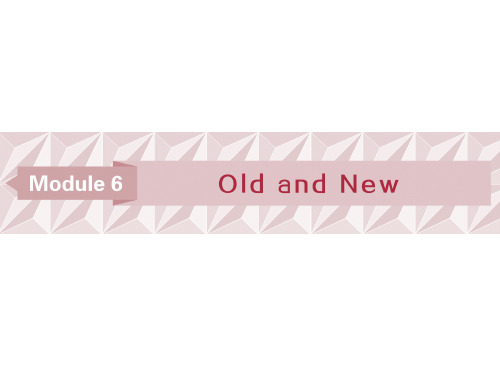
第一部分 必修3 Module 6
[句式仿写] 1.我们花费了一个月的时间准备这次宴会。 It _to_o_k__u_s__o_n_e_m__o_n_th__’__s_t_im__e_t_o_p_r_e_p_a_r_e_ for this party. 2.(牛津词典)我可以给他留个话儿吗? Would __it__b_e_p_o_s_s_ib_l_e_f_o_r_m__e_t_o__le_a_v_e a message for her? 3.物理是我们学校每个学生都很感兴趣的课程。 Physics is the subject in our school __in__w_h_i_c_h_e_v_e_r_y__st_u_d_e_n_t__is_ __in__te_r_e_s_te_d____.
“v.+back”短语全接触 ①hold back ②set back ③take back ④bring back
第一部分 必修3 Module 6
移动 到达 建议 总数
阻止;抑制 推迟,延缓 收回 带来
栏目 导引
第一部分 必修3 Module 6
1.It takes sb.some time/money to do sth.花费时间/金钱做某事 It took six years to build and cost US$ 20 billion. 2.It is possible (for sb.) to do sth.某人有可能做某事 Is it possible to see the relics now that they have been submerged? 3.“介词+关系代词” 引导定语从句 Mao Zedong wrote a poem in which he dreamed of “walls of stone to hold back clouds and rain till a smooth lake rises in the narrow gorges”.
Module6(课件)英语五年级上册
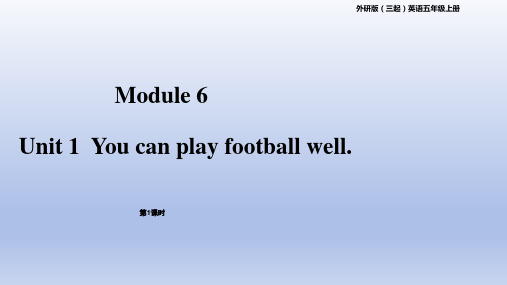
Homework
1. 跟读Activity 1至Activity 3的录音。 2. 用“can”写五个句子。
再见
外研版(三起)英语五年级上册
Module 6 Unit 2 He ran very fast.
第2课时
Look and say.
Warm-up
He can play football well.
一般过去时的结构:
He’s slow now, but healthy!
肯定句结构为:主语+动词的过去式+其它。
如: In the past, he ran very fast. 在过去,他跑的非常快。
否定句结构为:主语+did not (didn‘t)+动词原形+其它。
如: In the past, he didn’t run very fast. 在过去,他跑的不快。
我认为
Let’s learn.
Presentation
Amy: Hooray! Lingling, you’re a fantastic goalkeeper. I’m your first fan! Sam: You can play football well, Lingling. Lingling: Thank you.
外研版(三起)英语五年级上册
Module 6 Unit 1 You can play football well.
第1课时
Look and say.
Warm-up
Look, listen and say.
Presentation
Can he play basketball Oh, he can play it well!
新编剑桥商务英语初级 Module 6

Hotel amenities 宾馆便利设施
a fitness room/ gym 健身房 translation services 翻译服务 laundry service 洗衣服务
Types of Hotels 宾馆的种类
(5、4、3、2、1) star hotel/ luxurious hotel 星级/ 豪华宾馆 business hotel 商务酒店 inn 小旅馆 motel 汽车旅馆 hostel 招待所,学生公寓
6.1 Business travel 商务旅行
Focus 学习重点
熟悉与商务旅行相关的词汇 学会谈论商务旅行的相关话题 练习在听力和阅读过程中寻找具体信息 掌握间接引语的用法
Listening: Flight problems 航班问题
Vocabulary on flight aircraft n. 飞机 check-in 办理登机手续 delay v. 飞机晚点 journey n. 旅程 land v. 降落 luggage n. 行李 passenger n. 乘客 passport n. 护照
Listening: Flight problems 航班问题
Speaking: Process of boarding Describe the process of boarding with the words listed above.
Grammar:Reported speech 间接引语
Listening:At the hotel Exe. 6
Listening:At the hotel Exe. 7
Listening:At the hotel Exe. 8
外研版英语四年级下学期第六单元测试卷
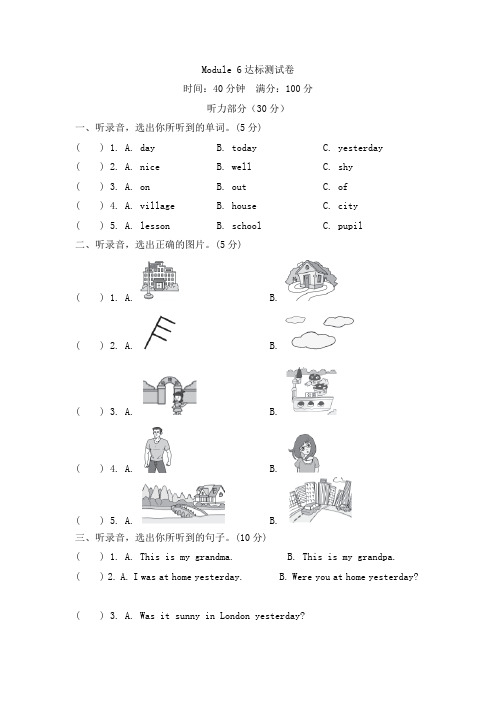
Module 6达标测试卷时间:40分钟满分:100分听力部分(30分)一、听录音,选出你所听到的单词。
(5分)( ) 1. A. day B. today C. yesterday ( ) 2. A. nice B. well C. shy( ) 3. A. on B. out C. of( ) 4. A. village B. house C. city( ) 5. A. lesson B. school C. pupil二、听录音,选出正确的图片。
(5分)( ) 1. A. B.( ) 2. A. B.( ) 3. A. B.( ) 4. A. B.( ) 5. A. B.三、听录音,选出你所听到的句子。
(10分)( ) 1. A. This is my grandma. B. This is my grandpa. ( ) 2. A. I was at home yesterday. B. Were you at home yesterday?( ) 3. A. Was it sunny in London yesterday?B. Was it windy in London yesterday?( ) 4. A. Shenzhen is a big city now.B.Shenzhen was a big city then. ( ) 5. A.It was a very small village then.B.It was a very big city then.四、听录音,将下列句子补充完整。
(10分)1. Were you at the park________?2. We're out for our Chinese________.3. Shenzhen is a ________ city now.4. I want to play in the________.5. —How are you ? —Very________. Thank you.笔试部分 (70分)五、选出与所给单词同类的一项,将序号写在题前括号内。
外研版一起点六年级上册Module6知识点汇总

外研版(一起点)六年级上册Module 6 知识汇总一、词汇world世界 difficult困难的 answer回答,答复 Miss(称呼)女士,小姐二、短语pen friend笔友 Chinese food中餐 in the park在公园里 answer question 回答问题 write back回信 make a poster制作一张海报 eight o clock八点 at half past three在三点半三、句子1. It’s difficult for me to use them.(使用它们对我来说很困难。
)2. Thank you for your letter.(谢谢你的来信。
)3. My school starts at eight o’clock.(我的学校在八点开始上课。
)4. It finishes at half past three.(在三点半结束。
)5. I’ve got some Chinese chopsticks.(我有一些中国的筷子。
)6. My brother has got a Chinese kite.(我弟弟有一个中国的风筝。
)7. Have you got a book about the US?(你有一本关于美国的书吗?)四、句型结构1. 主语+ has / have got ...eg : I have got some Chinese stamps.(我有一些中国的邮票。
)Mark has got a cut rabbit.(马克有一只可爱的兔子。
)2. 主语+ has / have + not got + 其他.eg: I haven’t got a book about China.(我没有关于中国的书。
)Amy hasn’t got some ice cream.(艾米没有冰淇淋。
)3. -- What time does your school start / finish?-- It starts / finishes at + 时间.eg: -- What time does your school start?(你的学校什么时候开始上课?) -- It starts at eight o’clock.(在八点开始上课。
外研版七年级英语上册Module 6 知识汇总

Module6知识梳理【重点短语】1.a trip to the zoo 到动物园的参观,动物园之旅2.welcome to... 欢迎到......3.many kinds of... 许多种......4.such as... 比如......5.different countries 不同的国家6.look at.... 看......7.lingling the panda 熊猫玲玲8.the black and white animal 黑白相间的动物9.live in Africa 生活在非洲10.a little fruit 一点儿水果11.30 kilos of bamboo a day 每天30公斤竹子12.as well as... 还有......13.the favourite of people 人们最喜欢的=people’s favourite14.all over the world 全世界15.an African animal 一只非洲动物16.live alone 单独生活17.be good at swimming 擅长游泳18.catch other animals for food 抓其他动物为食19.the world of animals 动物世界【重点句子】1.Welcome to Beijing Zoo. 欢迎到北京动物园。
2.The zoo has many kinds of animals.动物园里有许多种类的动物。
=There are kinds of animals in the zoo.3.The animals come from different countries and eat different food.这些动物来自不同的国家,吃不同的食物。
4.They also eat plants. 他们也吃植物。
5.--Do pandas eat plants and leaves? 熊猫吃植物和叶子吗?--Sure. They love bamboo. 当然。
外研版高中英语必修一Module6
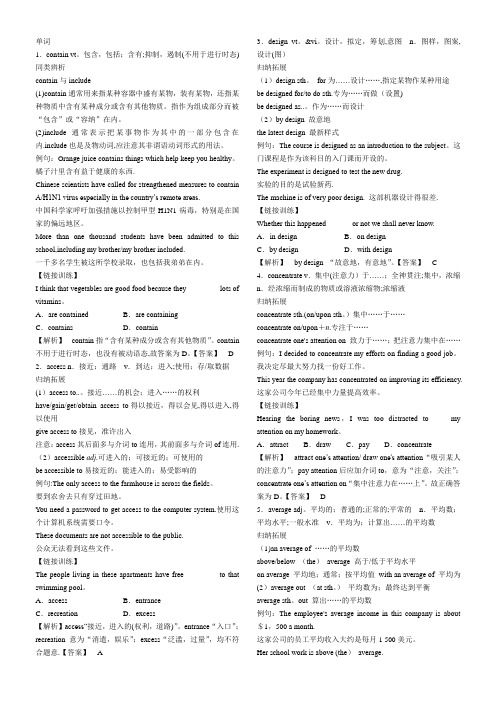
单词1.contain vt。
包含,包括;含有;抑制,遏制(不用于进行时态) 同类辨析contain与include(1)contain通常用来指某种容器中盛有某物,装有某物,还指某种物质中含有某种成分或含有其他物质。
指作为组成部分而被“包含”或“容纳”在内。
(2)include通常表示把某事物作为其中的一部分包含在内.include也是及物动词,应注意其非谓语动词形式的用法。
例句:Orange juice contains things which help keep you healthy。
橘子汁里含有益于健康的东西.Chinese scientists have called for strengthened measures to contain A/H1N1 virus especially in the country’s remote areas.中国科学家呼吁加强措施以控制甲型H1N1病毒,特别是在国家的偏远地区。
More than one thousand students have been admitted to this school,including my brother/my brother included.一千多名学生被这所学校录取,也包括我弟弟在内。
【链接训练】I think that vegetables are good food because they ________ lots of vitamins。
A.are contained B.are containingC.contains D.contain【解析】contain指“含有某种成分或含有其他物质”。
contain 不用于进行时态,也没有被动语态,故答案为D。
【答案】 D 2.access n.接近;通路v.到达;进入;使用;存/取数据归纳拓展(1)access to..。
接近……的机会;进入……的权利have/gain/get/obtain access to得以接近,得以会见,得以进入,得以使用give access to接见,准许出入注意:access其后面多与介词to连用,其前面多与介词of连用. (2)accessible adj.可进入的;可接近的;可使用的be accessible to易接近的;能进入的;易受影响的例句:The only access to the farmhouse is across the fields。
【知识点精讲精练】Module6 Hobbies
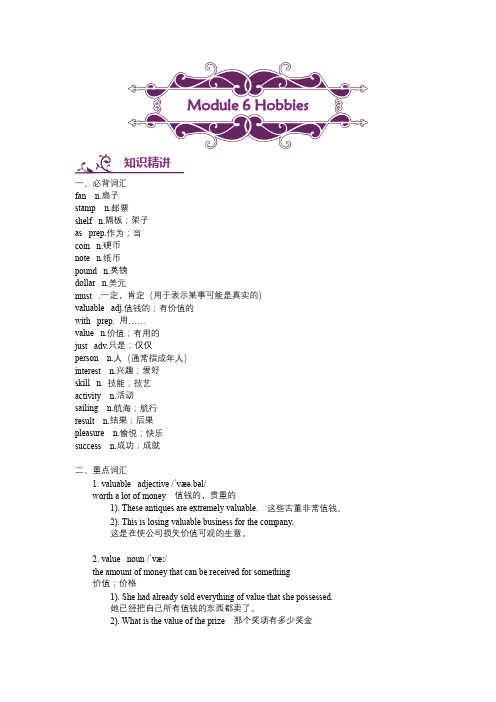
Module 6 Hobbies知识精讲一、必背词汇fan n.扇子stamp n.邮票shelf n.隔板;架子as prep.作为;当coin n.硬币note n.纸币pound n.英镑dollar n.美元must.一定,肯定(用于表示某事可能是真实的)valuable adj.值钱的;有价值的with prep. 用……value n.价值;有用的just adv.只是;仅仅person n.人(通常指成年人)interest n.兴趣;爱好skill n. 技能;技艺activity n.活动sailing n.航海;航行result n.结果;后果pleasure n.愉悦;快乐success n.成功;成就二、重点词汇1. valuable adjective /ˈvæə.bəl/worth a lot of money 值钱的,贵重的1). These antiques are extremely valuable. 这些古董非常值钱。
2). This is losing valuable business for the company.这是在使公司损失价值可观的生意。
2. value noun /ˈvæː/the amount of money that can be received for something价值;价格1). She had already sold everything of value that she possessed.她已经把自己所有值钱的东西都卖了。
2). What is the value of the prize 那个奖项有多少奖金3. interest noun /ˈɪəst/the feeling of wanting to give your attention to something or of wanting to be involved with and to discover more about something 兴趣,关注1). I’ve always had an interest in astronomy. 我一直对天文学感兴趣。
- 1、下载文档前请自行甄别文档内容的完整性,平台不提供额外的编辑、内容补充、找答案等附加服务。
- 2、"仅部分预览"的文档,不可在线预览部分如存在完整性等问题,可反馈申请退款(可完整预览的文档不适用该条件!)。
- 3、如文档侵犯您的权益,请联系客服反馈,我们会尽快为您处理(人工客服工作时间:9:00-18:30)。
Look and say:
What was he/ she doing at 7 am Yesterday?
She was swimming.
She was cleaning the house.
sit in the tree He was sitting in the tree
at 1pm yesterday.
sit by the river They were sitting by the river.
at 5pm last Monday.
What were they doing……? They were playing basketball at 7 pm last Friday .
sit on the grass
How is it going? ? send it to me a girl called Alice
go on sit by the river
in the garden on the grass in a tree
smile at
let me guess fall down go into
帽 匠
×
√
…at this time yesterday morning
at 5 pm last Sunday
√
× ×
…at 10 am last Saturday
√
What was he doing at 7 last Sunday?
Was he (doing)…?
Watch a basketball match
1. The Mad Hatter
4 2 2. 3
三 月 兔
The March Hare The White Rabbit
3. The Cheshire Cat 4. The Red King the Red Queen
5
1 5.
Alice
柴郡猫
突破重点与难点
• 1、How is it going ,Lingling ?意思是“ _______________ ”口语中 常用How is it going?来询问对方生活、工作中有什么新进展。 • 2、send sb. sth. =send____________ 如send me a book • = ________________ , 但是当其中的sth . 为人称代词it/them 时, 只能用________________ 如:send it to me , • 3、a girl called Alice 意思是 _________________又如:a dumpling called yuanxiao. • 我知道一个叫桂林的地方:______________________________。 • 4、I see . 在此句中see 的意思为:_______________ 。 • 5 Every boy and girl in Britain has read it . 再看下面的句子:Tom and Betty_____________(read) it before. 两个句子中谓语动词有何 不同?为什么?
重点句子
• • • • • 1. 近来怎么样? 2. 这本书是关于一个叫爱丽丝的女孩的。 3.一天,她拿着本书坐在河边。 4. 突然,一只白兔从她身边跑过。 5. 王后正在花园里玩,国王正
• 1过去进行时的构成 _____________________ • 2过去进行时的定义 ______________________
Module 6
Unit1 She was sitting by the river
翻译短语
• • • • • • 1. 近来怎么样? 近来怎么样? 2. 把它送给我 3. 一个名叫爱丽丝的女孩 4. 继续 5. 坐在河边 6. 在花园里 7. 在草地上 8. 在树上 9. 对……微笑 微笑 10. 让我猜猜 11.掉下去 12. 进入
have a sports meeting
What was Mr Feng doing?
Was he (doing) ?
have a picnic
What were they doing? Were they (doig on the grass
At 8 o’clock last Sunday.
×
√
A: Was he playing the piano at 9 am yesterday? B: No, he wasn’t. A: What was he doing? B: He was riding a bike.
